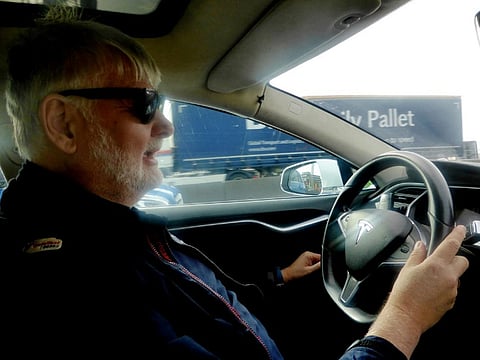Norway to install world’s first wireless EV charging stations for Oslo taxis
Using induction technology, Oslo electric taxis will be more energy efficient

Highlights
- Oslo will install charging plates in the road that connect to energy receivers in the vehicles
- All taxis in Oslo are set to be zero-emission from 2023
- Norway is tapping Finnish utilities firm Fortum, working with US company Momentum Dynamics and the City government of Oslo for the project
- The goal is to use "induction" technology, to make it as easy as possible to charge electric taxis
Norway’s capital Oslo will become the first city in the world to install wireless charging systems for electric taxis, hoping to make recharging quick and efficient enough to speed the takeup of non-polluting cabs.
The project will use induction technology, with charging plates installed in the road at taxi ranks linking to receivers installed in the vehicle, Finnish utility Fortum said on Thursday.
From 2023 onward all taxis in Oslo will have to be zero emission and Norway wants all new cars to be zero emission by 2025.
Among other nations, Britain and France have similar goals for 2040.
Fortum describes its induction charging system: "The project aims to install wireless charging using induction technology. Charging plates are installed in the ground where the taxi is parked and a receiver is installed in the taxi. This allows for charging up to 75 kilowatts. The project will be the first wireless fast-charging infrastructure for electric taxis anywhere in the world, and will also help the further development of wireless charging technology for all EV drivers."
Fortum has long been working with the taxi industry to enable electrification of the taxi fleet.
The greatest hurdle has proved to be the infrastructure: It is too time-consuming for taxi drivers to find a charger, plug in and then wait for the car to charge.
The wireless fast-charging project aims to solve these issues and thereby reduce climate emissions from the taxi sector – not only in Norway, but in the entire world.
Inductive charging
Using inductive charging, electricity is transferred through an air gap from one magnetic coil in the charger to a second magnetic coil fitted to the car. All you have to do is park in the right place so the coils are aligned, and charging will begin
The year 2020 and 2021 are expected to be breakout years for wireless charging technology. Wireless charging technology developers and automakers and suppliers are working to implement this wireless charging technology into future vehicles.
“The future is electric, and it is already here, right now. Wireless charging is a potential game changer,” said Sture Portvik, Oslo’s electro mobility manager, in a statement.
“From 2023 onward, all taxis in Oslo will be zero emission. Together with the taxi industry we will make sure that the shift is as user friendly and efficient as possible. Oslo will always be at the front of innovation and we are delighted to join forces with two of the industry’s most progressive players in this game-changing move to launch the world’s most ambitious plan for wireless charging of a taxi fleet.”
Big on EVs
Norway's residents have largely embraced EVs.
A third of new cars sold in the country last year were electric.
EVs are exempt from some taxes in Norway, where there's no fossil fuel car industry to lobby against EV incentives or high taxes on traditional cars.
The nation also wants all new cars to be zero emission by 2025, far outpacing the 2040 targets of the UK and France.
SAE International, the Society of Automotive Engineers, has developed the new J2954 Wireless Charging Standard created, which will enable wireless charging to be available across countries and across borders.
Sign up for the Daily Briefing
Get the latest news and updates straight to your inbox






